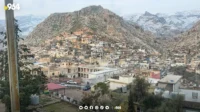Revered multifaith site
Concerns grow over neglect of historic Sikana Cemetery in Kurdistan Region
SULAYMANIYAH — Concerns are mounting over the potential deterioration of the historic Sikana Cemetery, one of the oldest and most significant burial grounds in the Kurdistan Region, located near the village of Sikana in Pshdar district, roughly 166 kilometers north of Sulaymaniyah. Local archaeologist Farhad Nasser warned that the cemetery, already suffering from neglect, could face destruction in the coming years.
“If it continues to be neglected in this manner, within a few years the gravestones could be vandalized, similar to what has happened to many other historical cemeteries in the region,” Nasser told 964media.
Nasser emphasized that Sikana Cemetery holds more than just ordinary graves. “The gravestones are large and adorned with symbols, carvings, and images that reflect the status of the deceased,” he said, calling for the government and relevant authorities to prioritize heritage protection by installing surveillance cameras or deploying guards. According to Nasser, several similar gravestones across Kurdistan have already been stolen or destroyed, and Sikana Cemetery could face a similar fate if action is not taken.
The cemetery’s remote location near the border with Iran has made it difficult for researchers to conduct extensive studies. The site serves as the resting place for followers of Islam, Christianity, and Judaism, reflecting the region’s diverse historical roots.
Mohammed Hassan, a local archaeologist and resident of Sikana, previously told 964media that the tombs are adorned with symbols like crosses, six-pointed stars, swords, and crescents, indicating a confluence of religious beliefs.
“Comprehensive archaeological investigations have not yet been conducted here, which are crucial to determining the exact historical timeline of this cemetery,” Hassan noted. He also suggested that some of the symbols on the gravestones could date back to pre-Islamic times, further highlighting the cemetery’s historical significance.
Over time, several plots have deteriorated or disappeared, particularly during the Iraq-Iran war when valuable artifacts were relocated by the Ba’ath regime to Baghdad. Those artifacts are believed to be housed in a museum in the capital.
Climate change and the presence of wild animals have also contributed to damaged gravestones, according to Faqi.
Despite changes over the centuries, the local community continues to hold the Sikana cemetery in reverence, still using the site to bury relatives in accordance with ancestral traditions. This ongoing practice has maintained a portion of the cemetery with recent and well-preserved graves, integrating old traditions with the needs of the present community.

Century-old cemetery emerges amid heavy rainfall and flooding in Akre

Yazidi shrine in Sinjar at risk of collapse

